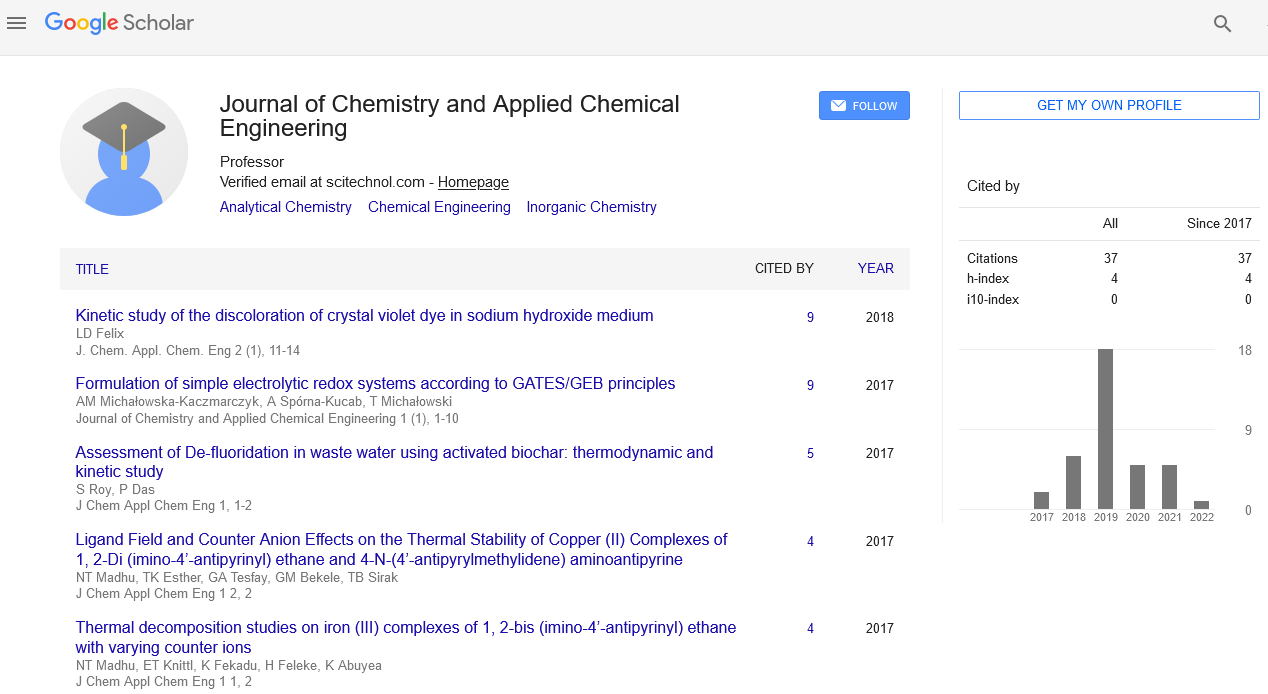Theoretical study on transition-metal carbide system as cathode catalyst in Li-O2 batteries
Man Yao and Yingying Yang
Dalian University of Technology, China
: J Chem Appl Chem Eng
Abstract
Lithium-oxygen (Li-O2) batteries have recently attracted extensive attention due to their high theoretical energy density and practically available energy density, which are essential for future electric vehicles and other highenergy storage devices. However, the sluggish charging and discharging kinetic rates limit its practical application, and suffers from many issues such as high ORR/OER overpotential, short cycle life, low current density, unstable electrode material, and electrolyte instability. One of the approaches to accelerate the sluggish electrochemical reactions is using electrocatalysts. In this paper, the first-principles calculation method is used to study the cathode catalysts in Li-O2 batteries based on transition-metal carbides (TMCs) system, including: to study the reaction mechanism during charging and discharging processes in lithium-air batteries; to build the theoretical model coupling of electron, ion, and interface in electrochemical reaction to determine the thermodynamics evaluation parameters of catalytic activity; to exploit the structure-activity relationship in electrochemical reactions, thereby determining the intrinsic properties affecting the catalytic activity. Finally, our work provides reliable information for the design, screening and development of new materials for Li-O2 batteries. The detailed studies are as follows: oxidized TiC surface as the potential state of TiC cathode is analyzed during OER, in which O layer helps O22- oxidation and Li-O bond activation, showing smaller O2 evolution barrier and lower charge voltage; doping effect on the catalytic activity of TiC; correlations between material properties relative to the adsorption/desorption behavior of active molecules and the catalytic activity of 3d-TMCs and early TMCs are constructed, in which the ORR overpotentials are inversely proportional to the Li4O2/LiO2 adsorption energies, meanwhile, the ORR overpotentials are proportional to the desorption energies of Li+ and the OER overpotentials are proportional to the O2 desorption energies. Besides, the study on catalytic activity of Ti2C MXene in Li-O2 is under way.
Recent Publications
1. Yingying Yang, Xiaowan Xue, Yuan Qin, Xudong Wang, Man Yao, Zhenhai Qin, Hao Huang (2018) Oxygen evolution reaction on pristine and oxidized TiC (100) surface in Li-O2 battery. The Journal of Physical Chemistry C 122: 12665-12672.
2. Yang, Yuan Qin, Xiaowan Xue, Xudong Wang, Man Yao, Hao Huang (2018) Intrinsic properties affecting the catalytic activity of 3d transition-metal carbides in Li-O2 battery. The Journal of Physical Chemistry C 122: 17812-17819.
3. Yingying Yang, Yuelin Wang, Man Yao, Xudong Wang, Hao Huang (2018) First-principles study of rocksalt early transition-metal carbides as potential catalysts for Li-O2 batteries. Physical Chemistry Chemical Physics 20: 30231-30238.
4. Yuan Qin, Yingying Yang, Man Yao, Xiaowan Xue, XuDong Wang, Hao Huang, Ting Chen, Dong Wang, Lijun Wan (2018) Self-assembly of an oligo(p-phenylenevinylene)-based molecule on HOPG surface: insights from multi-scale simulation and STM observation. RSC Advances 56: 31868-31873.
5. Hong Li, Yuan Qin, Yingying Yang, Man Yao, Xudong Wang, Haixuan Xu, Simon R. Phillpot (2018) The evolution of interaction between grain boundary and irradiation-induced point defects: Symmetric tilt GB in tungsten. Journal of Nuclear Materials 500: 42-49.
Biography
Man Yao was born in Liaoning, China. She received her PhD (material processing engineering, in 1998) at Dalian University of Technology, China, she joined the faculty at Dalian University of Technology as a lecturer in1989, and as a professor in 2001. In 2005, she began to work in University of Florida, America as a visiting scholar for three years. She has her expertise in multi-scale modeling and simulation of functional materials in photoelectricity and catalysis. Recent years, her research interest mainly focuses on the theoretical investigation and design of high-efficiency electrocatalysts for energy storage and conversion, and molecular self-assembly.
 Spanish
Spanish  Chinese
Chinese  Russian
Russian  German
German  French
French  Japanese
Japanese  Portuguese
Portuguese  Hindi
Hindi 